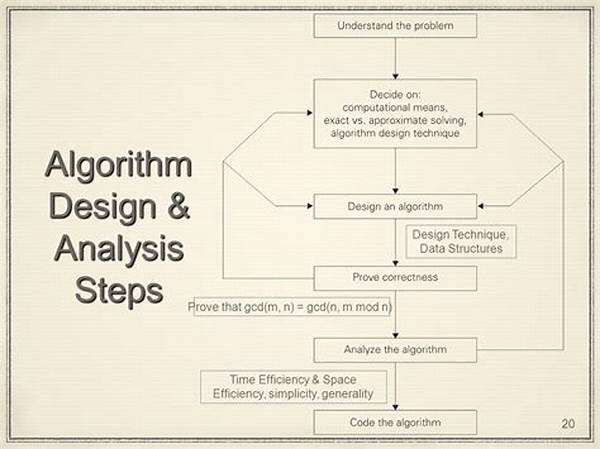
Algorithm Design For Fuel Efficiency
In today’s world, where environmental consciousness and economic efficiency are paramount, optimizing fuel usage is more crucial than ever. Imagine a technology that not only significantly reduces your carbon footprint but also saves you money every mile you drive. Sounds too good to be true? With algorithm design for fuel efficiency, this is not just possible but increasingly commonplace. By crafting intelligent systems capable of calculating the most fuel-efficient routes, speeds, and driving habits, we can revolutionize how we think about transport. The implications are vast: less air pollution, lower costs for consumers, and more sustainable cities. Fuel efficiency isn’t just a personal benefit; it’s a global necessity.
Read Now : **effects Of Load Variations On Fatigue**
The Power of Algorithm Design in Fuel Efficiency
Algorithm design for fuel efficiency offers groundbreaking advancements in creating smart, adaptive solutions to reduce fuel consumption. This technology employs sophisticated data analysis to predict the most efficient paths and engine operations, ensuring optimal fuel usage. Not only does it empower businesses to slash operational costs, but it also enables consumers to lower expenses and contribute positively to the environment. With continual advancements in this arena, the potential benefits grow ever more significant. Imagine millions of vehicles, each saving small amounts of fuel every day, collectively transforming our fuel reliant economy to one leaning on intelligent, efficient use of resources.
Benefits of Algorithm Design in Fuel Efficiency
1. Economic Savings: By implementing algorithm design for fuel efficiency, companies and individuals can drastically cut down on fuel costs.
2. Environmental Impact: Reduced emissions lead to a cleaner environment, aiding the fight against climate change.
3. Enhanced Navigation: Intelligent algorithms calculate more efficient routes, reducing travel time and fuel consumption.
4. Increased Vehicle Longevity: Optimizing energy usage contributes to less engine wear, extending vehicle lifespan.
5. Safety Boost: Smart algorithms also enhance driving safety by adjusting driving styles according to road conditions.
The Impact of Algorithm Design on Driving Habits
Imagine the possibilities when algorithm design for fuel efficiency becomes a norm. Vehicles automatically syncing with traffic data to adjust speeds, choose more efficient routes, and reduce idle times at intersections could drastically lessen congestion and energy wastage. People would experience smoother journeys, less frustration in traffic, and significant fuel savings over time. As these algorithms become essential to driving systems, they will foster a widespread cultural shift towards more mindful and sustainable driving habits. The future of transportation will see less reliance on fossil fuels and a more harmonious balance with nature.
The Science Behind Algorithm Design for Fuel Efficiency
In the heart of algorithm design for fuel efficiency, there are complex processes that combine data from geographic, thermal, and mechanical systems. By analyzing real-time data inputs, algorithms create dynamic optimization strategies that adapt to changing variables like traffic patterns and weather conditions. This constant learning and adjustment mean vehicles operate at peak efficiency, adapting and evolving over time. The algorithms are fine-tuned to consider not just immediate fuel savings but longer-term implications for vehicle health and environmental impact, making it an integral part of a sustainable future.
Read Now : Beginner Auto Repair Toolkit
The Future of Algorithm Design in Every Vehicle
Incorporating algorithm design for fuel efficiency into every vehicle is more than innovation; it’s a shift towards a more sustainable future. As this technology becomes widely available, it will redefine standards in the automotive industry, prioritizing eco-friendly designs across the board. Cars will be equipped with systems that autonomously decide on the most efficient energy consumption strategies. Driving will no longer be merely a journey but a contribution to a global effort to create a cleaner planet.
Implementing Algorithm Design for Fuel Efficiency on the Road
On a practical level, implementing algorithm design for fuel efficiency offers significant transformative potential. Imagine the roads filled with vehicles that can calculate and choose the best routes automatically, reducing traffic jams and minimizing fuel wastage. The ripple effect is monumental—less time and money spent on refueling, improved air quality, and drastically reduced carbon footprints. This real-world application of advanced algorithms not only promises economic and ecological benefits but also marks a pivotal step toward a smarter, more responsible society.
The Journey Towards Smarter Driving
Algorithm design for fuel efficiency isn’t a distant future; it’s happening now. Automakers are integrating these advanced systems into their vehicles, offering consumers a smarter, greener choice. With continuous improvement, the efficiency of these algorithms will only grow, offering increasingly precise solutions to the world’s fuel problems. Investment in this technology means investing in the future of transportation, one that aligns with both environmental needs and consumer demands for cost-effective solutions.
Summarizing the Value of Efficient Algorithm Design
In summary, the integration of algorithm design for fuel efficiency offers a myriad of benefits, from economic savings to environmental protection. These technological advancements support a future where our environmental footprint can be drastically reduced without sacrificing the convenience and efficiency of modern transportation. As algorithms become more sophisticated and widespread, their potential to equally benefit consumers, businesses, and the environment increases exponentially.
Algorithm design for fuel efficiency encapsulates the promise of technology to not just adapt the world we live in, but improve it substantially. With each mile driven on these innovative systems, we move closer to a future that honors our planet while serving our daily needs more efficiently. The road ahead is clear and open—one where innovation creates pathways to a sustainable and economically viable future for all.